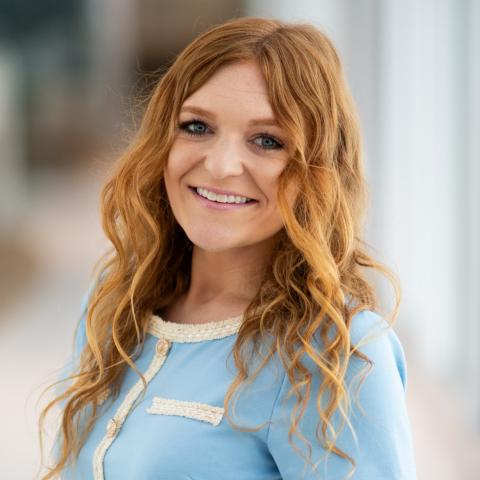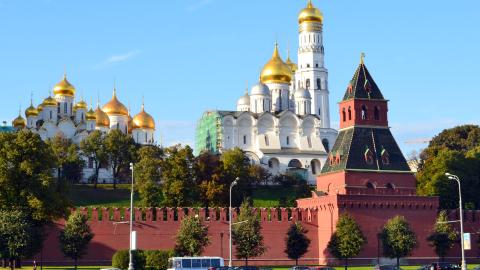Early last month, Ukrainian President Volodymyr Zelenskyy triggered a firestorm of condemnation from many Very Online social media accounts, some of which have known links to the Kremlin, over his supposed “ban of the church” in Ukraine. One of the figures pushing this talking point was the noted Russian propagandist and former Russia Today journalist Sameera Khan. Another fringe account tweeted a graphic of both Zelenskyy and Vladimir Putin with the subtle headline: “Zelensky is Satan.”
But at a time when the stakes are this high—achieving a just peace to the largest ground war in Europe since World War II—it is necessary to both debunk this lie andreinforce this foundational point: the Kremlin has weaponized Christianity and the Russian Orthodox Church (ROC) for decades, and as recently as the performative Orthodox Christmas ceasefire. Putin used the Church’s sites and symbols to fool religious Westerners into thinking he was one of us, setting out to defend that which we would also expend blood and treasure on. But in reality, he traded pomp and circumstance for a young generation completely disillusioned with the ROC.
First and foremost, the line that Zelenskyy “banned the church” is just false, and should bring into question the reliability and intentions of any account or public figure depicting the action as such. In reality, Zelenskyy’s decree forbid the activities of religious organizations “affiliated with centers of influence” in Russia and promised to examine ties between the Ukrainian Orthodox Church of the Moscow Patriarchate (UOC-MP) with its center in Moscow.
Any information circulating in the media during this war has great potential to alter the lives of civilians, women, and children. It should be vetted with care and public figures must act with extreme prudence while bringing stories to their audiences.
Now, what was the Zelenskyy government’s basis for taking this action? It turns out that this was not a tyrannical, top-down decree but rather the result of a ground campaign from the Ukrainian people, and in many instances, Kyiv-allegiant priests, after multiple reports of UOC-MP clergymen collaborating with the Russian invaders.
After a 2018 schism, Ukraine’s church split into The Orthodox Church of Ukraine (OCU) and the UOC-MP. The OCU was then granted ecclesiastical autonomy from the Patriarchate of Constantinople in 2019. And as more proof that this fight is not new, OCU churches offered support to the Western-looking Maidan protestors of 2014. The split was essentially based along geopolitical and civilizational lines, with the UOC-MP sticking with Moscow’s pan-Slavism and the OCU seeking a new pro-European orientation.
The UOC-MP claimed its full independence from Moscow in May, and before that decision, over 400 parishes had already broken away from the branch in the aftermath of the invasion. But reports continued to grow about pro-Russian sentiments and at times collaboration from clergymen in Moscow’s war of conquest. In June, the local council in Lviv voted unanimously to ban the formerly Moscow-affiliated church.
The most egregious example of collaboration is the case of Father Mykola Yevtushenko, who allegedly offered benedictions to Russian invaders and urged his congregants to welcome the Russian invading forces. Yevtushenko blessed the infamous Russian division that committed documented war crimes in Bucha, including numerous accounts of rape of women and young children. Investigators say Father Yevtushenko aided Russian forces during the invasion by pointing out local officials and army veterans to the invading forces.
Razumkov Center, a Kyiv-based think tank that has tracked Ukrainian religious affiliations for twenty years, released a 2021 survey showing that only 13 percent of Ukrainians identified with the Moscow-affiliated UOC. This is a fraction of the 68 percent of the country that identifies as Christian, as many are members of the Kyiv-oriented OCU or have an allegiance to general Orthodoxy. Many more Ukrainians are Evangelicals given that Ukrainian authorities welcomed in foreign missionaries after the fall of the Soviet Union.
Investigating UOC-MP ties to the Russian war machine is in no way discriminatory towards the vast majority of Ukrainians who identify as Christian nor is it an attack or ban on Christian faith in Ukraine. In fact, it is an “open secret” that the Kremlin has long operated out of the ROC to send agents abroad.
Putin has exploited Orthodox Christianity and sought to deceive the public with the claim that his brutal war in Ukraine is necessary to protect Christian civilization from the decadence of the West. And this scheme is not new: it’s part of a decades-long Kremlin strategy to advance the concept of Russkiy Mir, the Russian World, to deepen Russian soft power and cultural ties with Ukraine, Belarus, and other post-Soviet states. The ROC is the backbone of this venture and Putin has used the Church to justify Russian expansion in Georgia and Ukraine—with the unwavering support of his ally, Patriarch Kirill of Moscow.
But even Patriarch Kirill, the avowed Russian nationalist who sees the Russian invasion of Ukraine as a holy war, claimed to “fully understand how the Ukrainian Orthodox Church is suffering today” after the branch decided to separate from Moscow in May. Though he has since told congregants worried about the war that “sacrifice in the course of carrying out your military duty washes away all sins.”
And although Kremlin spokesman Dmitry Peskov and other Kremlin talking heads insisted that Ukrainian authorities are “waging a war on the Russian Orthodox Church” in the wake of this investigation, the true threat to the Russian Orthodox Church comes from within. The perceived marriage between the ROC and the Kremlin has resulted in a generation of young Russians almost entirely disinterested in the Church.
Those youth who are choosing religion in Russia are in many instances opting for growing Evangelical churches. Meanwhile, Russian authorities have worked to contain and restrain such attractive sects through their “foreign agent” law.
As a young Russian friend told me last spring, just days before Russia’s full-scale invasion of Ukraine: “I would say my views on religion have been influenced a lot by the Russian government, but not in a good sense.”
Right now, Americans and our allies should be focused on enabling Ukraine to bring about a just peace to Russia’s war of conquest. The Biden administration’s weak responses to Russian provocations in the year leading up to the war led to biggest deterrence failure since the Cold War. Now Zelenskyy is dedicated to attaining this just peace by dealing with the reality on the ground. It is a tragedy that Putin has weaponized a religion in his war of conquest, but it is wise for Zelenskyy to protect his citizens from collaborators—no matter where they emerge.















